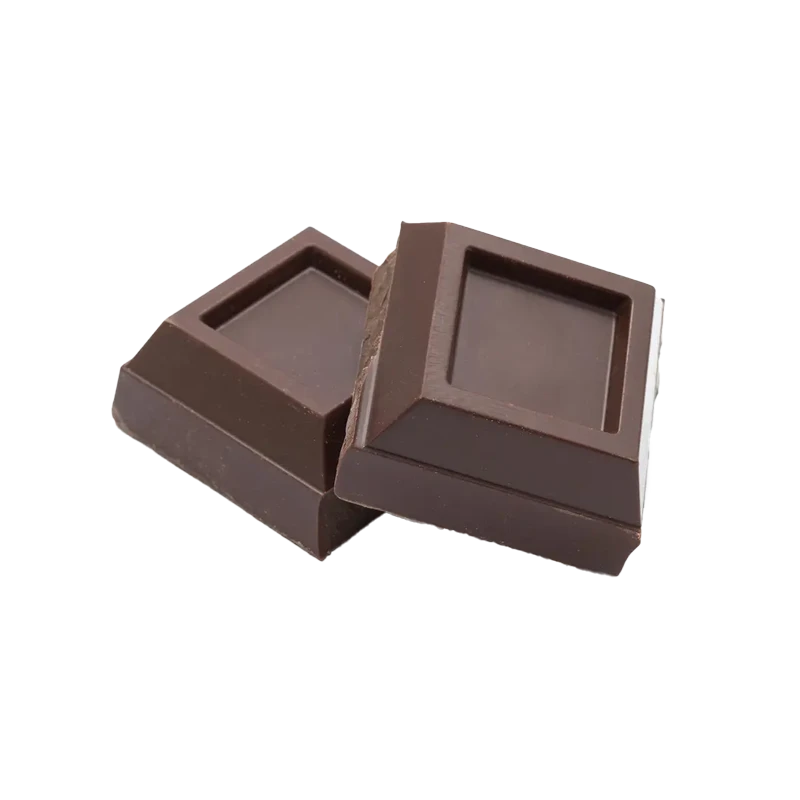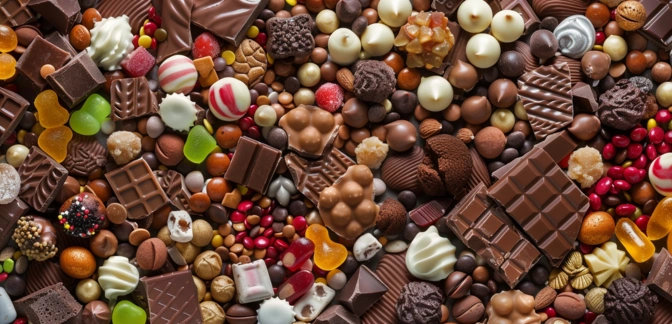Chocolate — Nutrients, Health Benefits, And Shopping Tips

Written by Listonic Team
Last update on September 4, 2024
Nutrients
Nutrition facts
Amount per 100 g
Calories
🔥 546 kcal
| Nutrition per: 100 g | Value | % Daily Value* |
|---|---|---|
| Carbs | 61 g | 22.18% |
| Fiber | 7 g | 25% |
| Sugars | 48 g | 96% |
| Glycemic Index | 40 | - |
| Protein | 5 g | 10% |
| Sodium | 24 mg | 1.04% |
| Total Fat | 31 g | 39.74% |
*The % of Daily Value (DV) tells you how much a nutrient in a serving of food contributes to a daily diet. 2,000 calories a day is used for general nutrition advice.
7 g
🥔 Good Fiber Content
40
🟢 Low Glycemic Index
Key takeaways
Health benefits
- Rich in antioxidants, particularly dark chocolate, which helps protect the body from free radicals and reduce inflammation.
- Contains essential minerals such as iron, magnesium, and copper, which support overall health and well-being.
- May support heart health by improving blood flow and lowering blood pressure due to its flavonoid content.
- Enhances mood by stimulating the production of endorphins and serotonin.
Health risks
- High sugar content in many chocolate products, which can contribute to weight gain, tooth decay, and increased risk of diabetes when consumed frequently.
- High calorie content particularly in milk chocolate or chocolate products containing added fats, which can lead to weight gain if consumed in large quantities.
- Potential for caffeine-related side effects such as increased heart rate, insomnia, or anxiety, particularly in dark chocolate with higher caffeine content.
- Risk of allergic reactions particularly in individuals with allergies to cocoa or other ingredients commonly found in chocolate, such as nuts or dairy.
How to choose chocolate
When indulging in chocolate, prioritize pieces that have a smooth, glossy finish without any white spots, which are often a sign of temperature mishandling known as 'bloom.' The snap of a chocolate bar should be clean and sharp, indicative of proper tempering.
Discard any chocolate that appears dull or has an uneven texture, as these could suggest old or poor-quality production. Good quality chocolate should melt evenly in your mouth, releasing a complex flavor profile that is neither overly bitter nor excessively sweet.

How to store chocolate
Chocolate should be stored in a cool, dry place away from direct sunlight. A pantry or cupboard is ideal to maintain its texture and flavor. Properly stored, chocolate can last for several months.
Exposure to heat and humidity can cause chocolate to melt or bloom, affecting its appearance and taste. Avoid refrigerating chocolate, as this can lead to condensation. Keep it in an airtight container to preserve its quality and prevent absorption of odors.
✅ Extra Tip
How long does it last?
Chocolate can last for 1-2 years when stored in a cool, dark place. Dark chocolate has a longer shelf life than milk or white chocolate. Always check for any signs of bloom or off flavors before consuming.
What to do with leftovers?
Leftover chocolate can be used in a variety of sweet treats. Melt it and drizzle over ice cream, cakes, or brownies for a rich, indulgent topping, or mix it into a milkshake or hot chocolate for a comforting drink. Chocolate is also great when chopped and added to cookies, muffins, or granola bars.
Use melted chocolate to dip fruits like strawberries, bananas, or apples, or use it as a filling for truffles or candies. If you have a lot of chocolate, consider making a batch of chocolate bark with nuts and dried fruits, or using it in a fondue with marshmallows and pretzels for dipping. Chocolate can also be grated and sprinkled over whipped cream on desserts or blended into a smoothie for extra richness. For a quick snack, try making chocolate-covered nuts or using chocolate pieces in a trail mix with dried fruits and seeds.
👨⚕️️ Medical disclaimer
Discover products from other categories
Listonic Team
Fact-checked
Our editorial team checked this article to make sure it was accurate at the time of publishing it.
Get the top-rated shopping list app

chocolate
1 piece







